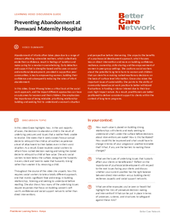Abandonment of infants often takes place due to a range of stressors affecting vulnerable mothers, which collectively erode their confidence, result in feelings of isolation and make caring for a newborn overwhelming. Early detection and support that is strengths-based and focuses on social and emotional development, provided in supportive peer communities, is key to empowering women, building their confidence and subsequently reducing the rates of infant abandonment.
In this video, Grace Mwangi takes a critical look at the social work approach, and the impact different approaches can have on outcomes for women and their children. She emphasizes the importance of being relatable, prioritizing relationship-building and seeking first to understand a woman’s situation and perspective before intervening. She unpacks the benefits of a psychosocial development approach, which focuses less on direct intervention and more on building confidence, resilience, ownership, skills-sharing and the empowerment of women in peer group settings. She cautions social workers about the potential long-term harm to women and children that can stem from making rushed reactionary decisions on the basis of surface level information. Grace also raises the important issue of sustainability. She points to the ability of community-based social work practice to better withstand fluctuations in funding or donor interest due to their low-cost, high-impact nature. As a result, practitioners are better positioned to deliver consistent support to clients within the context of long-term programs.
This video is part of a series of practitioner learning videos from Kenya.
For more practitioner learning videos, watch our Cambodia and Uganda series.

